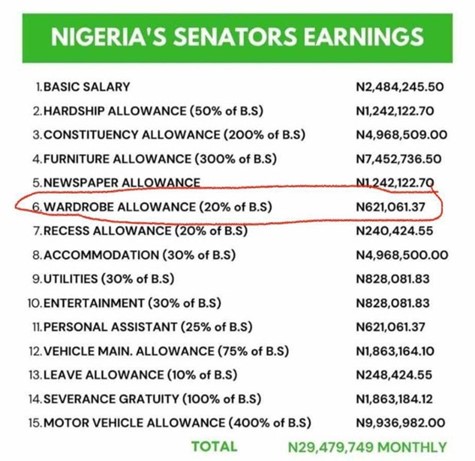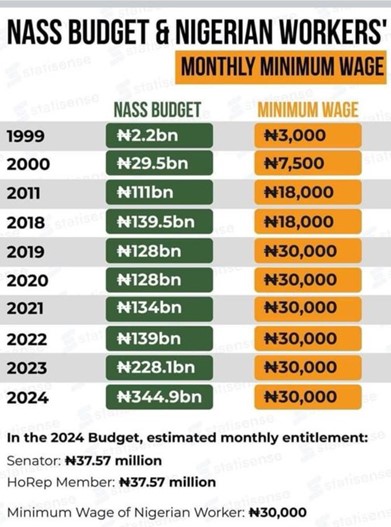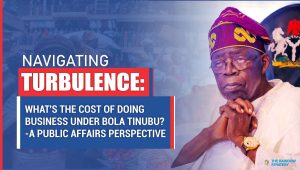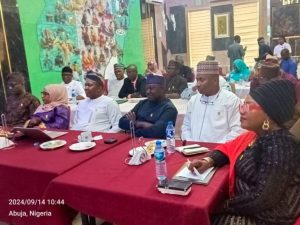Imagine a large company, Empowerment Techies Ltd, where the executives enjoy lavish salaries, extravagant bonuses, and luxurious perks. In contrast, the frontline workers, who keep the company running day-to-day, are paid meager wages and often struggle to make ends meet. This disparity breeds resentment, reduces morale, and undermines the company’s efficiency. Eventually, the company’s performance suffers because the workers feel undervalued and disconnected from the leadership, leading to a breakdown in trust and productivity.
This analogy parallels the situation in Nigeria, where the divergence in wages and allowances between public (political office holders) and civil servants mirrors the imbalance seen in the hypothetical company. Just as the company would need to address its internal disparities to ensure long-term success and cohesion, Nigeria must tackle the wage disparity between its public and civil servants to build a more equitable and functional society.
This huge disparity is at the heart of the recurring conflict between labour unions and government leaders. Labour unions have been advocating for better wages, benefits, and working conditions for workers, and consistently highlight significant socio-economic and governance challenges that the President Tinubu administration must address.

(Pictorial representation of the earnings of Nigerian Senators found online)
Unfortunately, the scenario regarding long-drawn negotiations between Nigerian governments, the organised private sector and labour since May is getting messy. For instance, after the forth and back by the tripartite minimum wage negotiation committee set up by the Federal Government, a fortnight ago the Presidency had appealed to Nigerians “not to put unnecessary pressure on the President”, assuring them that the Federal Government would transmit the proposed bill on the new national minimum wage to the National Assembly once it was ready. A week later, media reports indicate that the Southern Governors’ Forum proposed decentralising minimum wage negotiations to state governments. Expectedly, Organised Labour, including the Nigeria Labour Congress and the Trade Union Congress, has rejected the Forum’s proposal as “unfriendly and anti-worker”, noting that allowing states to determine their minimum wages would be detrimental to workers’ welfare.
Public Affairs Perspective: Key Points To Note.
The role of labour in ensuring effective governance and economic development is quite crucial, now more than ever before. Here are key points that the government must note to ensure that labour in Nigeria feels valued and connected to leadership to maintain trust and productivity within the public sector.
- Economic Disparity and Social Inequality
Income Inequality: Nigeria has a high level of economic disparity, with a significant gap between the wealthy elite and the impoverished majority. The stark contrast in the remuneration of political officers and civil servants exacerbates this inequality. Political officers, including lawmakers and top government officials, often receive hefty salaries, allowances, and benefits. In contrast, civil servants, who form the backbone of public administration, are usually underpaid and often face delays in salary payments.
Public Perception and Trust: The substantial divergence in wages contributes to a growing distrust in government and public institutions. Citizens perceive political officers as being self-serving and disconnected from the realities of the average Nigerian. This perception undermines public confidence in government and can lead to social unrest and a lack of civic engagement.
- Governance and Accountability
Governance Challenges: The disparity in wages highlights issues of governance and accountability. High salaries and allowances for political officers often come without corresponding improvements in governance and public service delivery. This situation suggests that resources are not being efficiently allocated or utilized for the public good.
Corruption and Mismanagement: The significant benefits enjoyed by political officers can incentivize corrupt practices. The high stakes associated with political offices can lead to a culture of corruption and mismanagement, further diverting resources away from essential public services and infrastructure.

(Pictorial representation of NASS Budget & Nigerian Workers’ Monthly Minumum Wage found online)
3. Economic Implications
Budgetary Strain: The high cost of maintaining political officers places a strain on national and state budgets. Funds that could be directed towards development projects, healthcare, education, and other critical areas are often diverted to cover the substantial allowances and benefits of political officers. This misallocation of resources hampers economic development and poverty alleviation efforts.
Labour Market Distortions: The wage disparity can distort the labour market by making public sector jobs, particularly political positions, more attractive than other forms of employment. This can lead to an inefficient allocation of talent, with individuals seeking political office for financial gain rather than a genuine desire to serve the public.
Recommendations for Addressing the Disparity
Wage Reforms: Implementing wage reforms to narrow the gap between the earnings of political officers and civil servants is crucial. This could involve reducing the allowances and benefits of political officers while ensuring that civil servants receive fair and timely compensation.
Transparent Compensation Policies: Establishing transparent and merit-based compensation policies can help ensure that remuneration reflects performance and contribution to public service. This would help restore public trust and demonstrate a commitment to fairness and accountability.
Strengthening Institutions: Enhancing the capacity and independence of institutions responsible for overseeing public sector wages, such as the Revenue Mobilization Allocation and Fiscal Commission (RMAFC), can ensure that wage policies are equitable and sustainable.
Public Engagement and Accountability: Increasing public engagement and oversight in the budgeting process can help hold political officers accountable for their compensation and ensure that public resources are used efficiently. Civil society organizations and the media play a critical role in this process.
Economic Diversification and Development: Addressing the broader economic disparities in Nigeria requires efforts to diversify the economy, create jobs, and reduce poverty. By improving the overall economic situation, the relative disparity between different sectors can also be mitigated.
In conclusion, the wage disparity between political officers and civil servants in Nigeria is a symptom of broader issues related to governance, accountability, and economic inequality. Addressing this divergence requires comprehensive reforms and a commitment to building a more equitable and transparent public sector.








